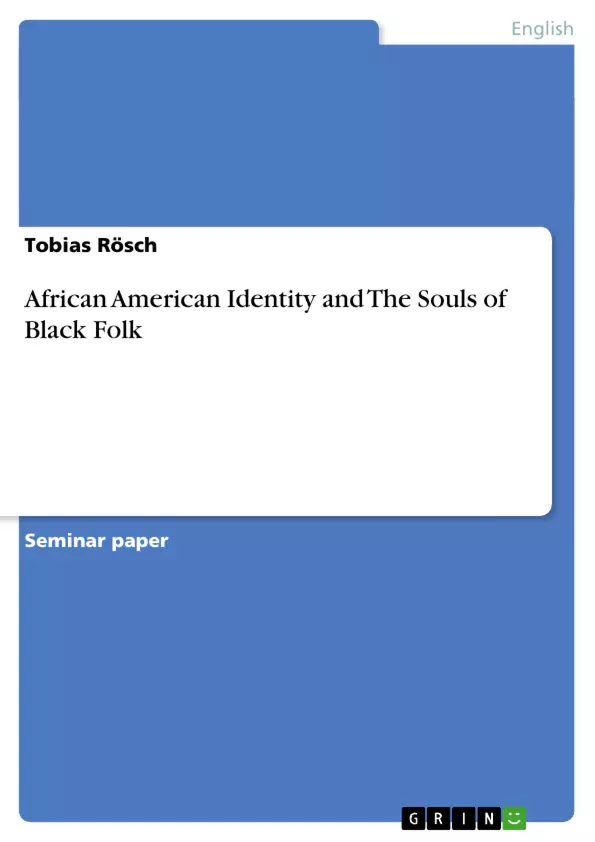The present paper investigates the significance of African American identity in relation to the historical circumstances of the post-Reconstruction period. It is a simple truth that history rarely presents us the whole picture: Facts may be distorted, specific times or events may be over- or underrepresented, or left out altogether. In The Souls of Black Folk, written by William Edward Burghardt Du Bois, we find an attempt to rectify one-sided historiography. This book, probably the best-known of his many scientific and literary writings, features forays into autobiography, fiction, eulogy and even musicology.
Inhaltsverzeichnis (Table of Contents)
- Introduction
- 1. A History of Oppression
- 2. A child of its time: The Souls of Black Folk
- 3. Fatherhood, race and racism in "Of The Passing Of The First-Born"
- 4. Minstrel Shows
- 5. Black identity and "double consciousness"
- 5.1 The internal conflict of African Americans
- 5.2 "Double consciousness" as a medical term
- 6. Social exclusion
- 6.1. The image of the Veil
- 6.2 Racism in historiography and the sciences
- 6.3 Stepping out of the Veil: Idealism v. Materialism
- 7. Challenging the rule of the father
- 8. Conclusion
Zielsetzung und Themenschwerpunkte (Objectives and Key Themes)
This paper examines the significance of African American identity during the post-Reconstruction period. It explores how the historical events of this era shaped the experiences and perceptions of African Americans, particularly focusing on the work of W.E.B. Du Bois in "The Souls of Black Folk."
- The historical context of oppression and discrimination faced by African Americans in the post-Reconstruction era
- Du Bois's exploration of African American identity and its complexities
- The concept of "double consciousness" and its implications for African American self-perception
- The role of social exclusion and racism in shaping African American experiences
- The challenges and aspirations of African Americans in the post-Reconstruction South
Zusammenfassung der Kapitel (Chapter Summaries)
The introduction sets the stage for the paper, highlighting the importance of understanding the historical context surrounding African American identity in the post-Reconstruction period. The paper argues that "The Souls of Black Folk" provides a crucial perspective on this subject, showcasing the experiences and struggles of African Americans during this time.
Chapter 1 delves into the history of oppression and discrimination faced by African Americans, drawing upon legal cases and historical events. The chapter examines the legal status of slaves, the impact of the Civil War, and the ongoing struggles for equal rights and opportunities.
Chapter 2 explores "The Souls of Black Folk" itself, analyzing its significance as a document that attempted to rectify one-sided historiography and provide a more nuanced understanding of African American experiences. The chapter highlights the diverse perspectives and approaches present in Du Bois's work, emphasizing the overarching theme of demarginalizing the colored race and highlighting African American identity.
Chapter 3 focuses on the theme of fatherhood, race, and racism within the context of "Of The Passing Of The First-Born," a chapter from "The Souls of Black Folk." This chapter explores the complexities of fatherhood for African Americans and how it intersects with racial prejudice and discrimination.
Chapter 4 examines minstrel shows, a popular form of entertainment at the time, and its impact on African American identity. The chapter analyzes the racist representations and stereotypes perpetuated through minstrel shows and their consequences for the black community.
Chapter 5 delves into the concept of "double consciousness," a key theme in Du Bois's work. The chapter examines the internal conflict experienced by African Americans, grappling with their identities as both black and American, and the implications of this duality for their sense of self and belonging.
Chapter 6 explores the social exclusion faced by African Americans, focusing on the image of the "veil," a metaphor Du Bois used to describe the separation between black and white society. The chapter analyzes the role of racism in historiography and the sciences, illustrating how it perpetuated prejudice and distorted understandings of black life.
Chapter 7 challenges the "rule of the father," questioning the traditional authority structures that dominated African American communities. The chapter examines the need for a new model of leadership and social organization that would better address the specific needs and aspirations of African Americans.
Schlüsselwörter (Keywords)
The main keywords and focus topics of this paper include: African American identity, post-Reconstruction era, "The Souls of Black Folk," W.E.B. Du Bois, double consciousness, social exclusion, racism, historiography, fatherhood, and the "veil."
Frequently Asked Questions
What is the main theme of W.E.B. Du Bois's "The Souls of Black Folk"?
The book explores African American identity during the post-Reconstruction period, focusing on the struggle for racial demarginalization and the psychological impact of oppression.
What does the term "double consciousness" mean?
Double consciousness is the internal conflict experienced by African Americans who must view themselves both through their own eyes and through the eyes of a racist society.
What is the metaphor of the "Veil" in Du Bois's work?
The "Veil" represents the social and psychological barrier that separates Black and white society, leading to social exclusion and distorted perceptions of Black life.
How does the document address racism in historiography?
It highlights how history often presents a one-sided picture, underrepresenting or ignoring the events and perspectives of African Americans, which Du Bois sought to rectify.
What was the impact of minstrel shows on Black identity?
Minstrel shows perpetuated racist stereotypes and representations, which had significant negative consequences for the perception of the Black community.
What is the "rule of the father" mentioned in the text?
It refers to traditional authority structures within African American communities that Du Bois suggests need to be challenged in favor of new leadership models.
- Citation du texte
- Tobias Rösch (Auteur), 2008, African American Identity and The Souls of Black Folk, Munich, GRIN Verlag, https://www.grin.com/document/140268



